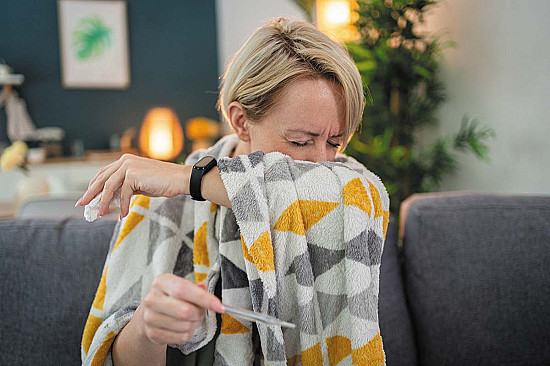COVID tests: Do at-home tests work on newer variants?
- Reviewed by Michelle Chan, MD, Contributor; Editorial Advisory Board Member, Harvard Health Publishing

If you develop respiratory symptoms, you may worry that you have COVID-19. One easy way to check is with an at-home COVID test. These tests are widely available at drugstores, supermarkets, and online retailers like Amazon.
Here's a closer look at at-home COVID tests: how they work, when to test, and how to get free COVID test kits.
How do at-home COVID tests work?
COVID-19 is caused by the SARS CoV-2 virus. At-home over-the-counter (OTC) COVID-19 tests look for proteins from the SARS CoV-2 virus. These proteins are called antigens. Results from rapid, at-home antigen tests are often available within 15 minutes. If you test positive, you are very likely to be infected. However, there is a higher chance of false negatives with antigen tests, which means that you could test negative and still have an active infection.
Still, because at-home tests return results quickly and have a low false-positive rate, if they are used correctly, they can be very helpful.
Do at-home COVID tests work against newer variants?
At-home COVID tests should work against new COVID variants. "The antigen that the at-home tests look for has remained fairly stable even as the virus mutates and new strains of COVID develop," explains Dr. Michelle Chan, an infectious disease physician at Beth Israel Deaconess Medical Center and an instructor in medicine at Harvard Medical School. Research suggests that in general, antigen tests do a good job of picking up a variety of COVID-19 variants.
Can you use COVID tests after they've expired?
Generally, the FDA doesn't recommend that you use expired COVID tests — but don't throw out your tests just yet. The FDA has extended expiration dates for some COVID tests. Check this FDA website page to see if your home test kit has an extended expiration date.
When should you test for COVID?
"You should use an at-home COVID test if you have respiratory symptoms such as a cough, fever, and runny nose," advises Dr. Chan. You may also want to test if you were exposed to someone who has COVID-19, or if you are going to be around someone who is older or immunocompromised — anyone who is at high risk of becoming very ill from COVID-19 infection," adds Dr. Chan.
In general, at-home COVID tests are most effective when you have respiratory symptoms. A study published in the journal Microbiology Spectrum looked at Binax COVID tests and found that they picked up almost 90% of COVID cases when people had symptoms. But they only picked up about half of asymptomatic cases.
If you have a positive COVID test, you have the virus. If it's negative, the FDA recommends that you check again with a repeat test 48 hours later to reduce the chance of a false negative.
Free COVID test kits
At-home COVID tests can be expensive. You can order free government COVID test kits by mail at this U.S. Department of Health & Human Services website. Each household can receive one order of four tests for free.
If you need an at-home test earlier, call your insurance company. Some plans still offer some coverage of at-home COVID tests.
COVID and flu combination tests: What to know
The FDA has granted emergency use authorizations for several at-home, OTC, combined flu and COVID-19 tests. One test that has received FDA marketing authorization, the Healgen Rapid Check COVID-19/Flu A&B Antigen Test, can pick up over 90% of cases of both COVID-19 and the flu.
"If you have respiratory symptoms, it's an easy way to figure out if you have the flu, COVID-19, or both, without needing to venture out to your doctor's office," explains Dr. Chan. You can support public health efforts to track COVID and flu levels in the U.S. by reporting your test result (whether it's positive or negative) here.
The best defense against both COVID-19 and the flu is to get vaccinated for both. Vaccines reduce the risk of infections, as well as developing complications if you do get sick.
About the Author

Hallie Levine, Health Writer
About the Reviewer

Michelle Chan, MD, Contributor; Editorial Advisory Board Member, Harvard Health Publishing
Disclaimer:
As a service to our readers, Harvard Health Publishing provides access to our library of archived content. Please note the date of last review or update on all articles.
No content on this site, regardless of date, should ever be used as a substitute for direct medical advice from your doctor or other qualified clinician.















